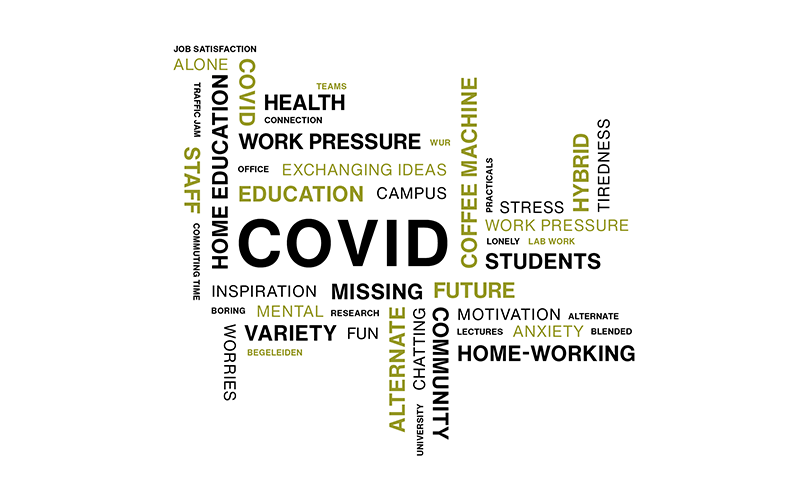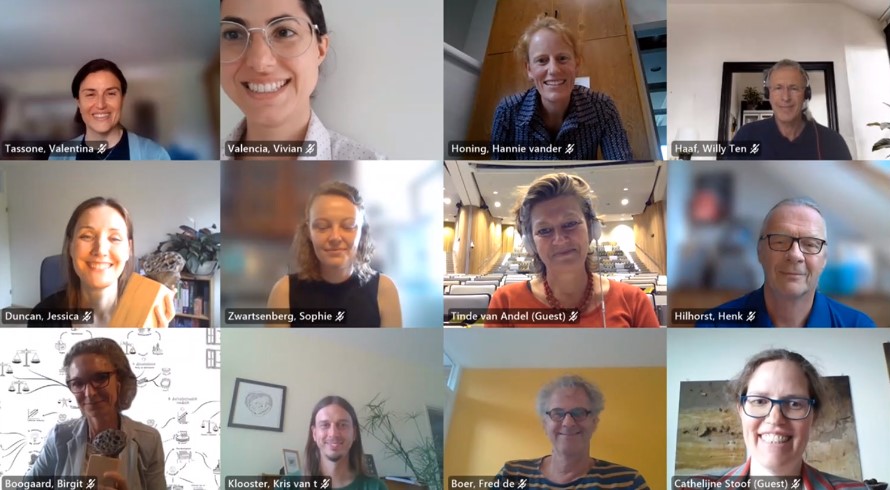How are you feeling, what did the past year bring you, and how do you see the future? To get answers to these and other questions, Resource sent a survey to staff and students. An analysis of the results shows that what people have missed most is personal contact, and that they would like to see working part of the week at home become the norm.
It’s obvious that Covid-19 has affected our lives. Working and studying at home became the new normal over the past year and, by trial and error, online education was established at astonishing speed. How are staff and students feeling after all these months? And: what are their expectations of the future? The survey contained over 25 questions, and the open questions were answered at length. 79 students and 236 staff members took part in the study. So particularly for the students, we must see the figures as a rough indication. They give us an impression but they are not representative of the WUR population as a whole.
Five conclusions
Broadly, we can draw five conclusions. About one quarter of the staff have found the Covid crisis very difficult, partly because of having to work at home so much. And yet 48 per cent see exactly that as a positive development. Less commuting time and more freedom to plan their work their own way are the main plus points, and that applied to students and online education too. A second conclusion is that nearly three out of every four staff members are working entirely from home. They say they are not very happy with the work pressure and the work-life balance.
Contact is the source of my work satisfaction
But they would like to go on working at home for two days a week: nearly two out of three staff members want to combine a home office with going into work. The third conclusion is that the respondents believe that higher education has been permanently changed by the Covid crisis. They expect that home-based education will continue to be an element in higher education. 66 per cent of the respondents think that digital home-based education is a good addition to in-person classes and lectures. Only 27 per cent of the students who took the survey think that their education should go back to the way it was before the crisis.
Attention problems
There were some reservations about studying at home, though. The students warn that the lack of informal contact before, during and after the online classes is a problem, and so is the lack of interaction during the class. ‘Online classes just don’t work for everybody,’ writes one teacher, ‘especially not for people with attention problems. I know students who have fallen badly behind or are underachieving without face-to-face classes.’
Another teacher: ‘I am concerned about my students’ mental health. As a teacher, I can only look on helplessly, which is very frustrating.’ The fourth conclusion is that more than six out of 10 students have found the Covid crisis very or extremely difficult, due to low mood, worries or stress. Positive points they see are that they appreciate their families more and that they have taken up new hobbies. But students give studying at home very low marks: that is the fifth conclusion we can draw. One in three have also been doing less work since the crisis.
Longing
So much for the numbers and percentages. Equally interesting are the answers given to the open questions: these are personal, open and extensive. About 250 respondents answered the open question: What is the biggest problem you experience at the moment in relation to studying or working at WUR? The answer seems to be: we long for contact. Half the respondents mention missing contact with their colleagues. Especially spontaneous encounters. Everything has to be planned now. ‘I miss my colleagues, an inspiring environment and the surprise encounters,’ writes one colleague. And: ‘There is much less debate going on.’ Or: ‘Contact is the source of my job satisfaction.’
I miss my colleagues, an inspiring environment and the surprise encounters
One teacher writes: ‘I want to be able to see from a student’s face whether they are lost or the penny has dropped.’ The problem for one manager is: ‘how to keep on motivating my team when they work at home.’ A first-year student writes: ‘Because of all the online education, I hardly know any fellow students. When I do see them on campus, it’s always the same people, because all the groups are formed alphabetically.’
Although the tone of a lot of reactions gives cause for concern, there are other responses too, of course. ‘Don’t emphasize problems so much. Convincing students, PhD researchers and tenure trackers that they’re in danger of falling behind won’t help. Life doesn’t always unfold along straight lines. Stay positive, we’re doing very well.’ And: ‘I am full of admiration for the efficiency with which IT infrastructure has facilitated working at home on a large scale.’
Alternate
As for continuing to work at home, the survey respondents are pretty much agreed that it’s a good idea. But they do want to alternate it with working on campus or at other WUR locations. ‘Try to set up blended working as well as possible,’ is one response. Opinions differ on hybrid education. ‘We should avoid that as far as possible; the quality is much poorer than face-to-face education.’ Or is it? ‘Lectures can be online, while seminars and practicals should be on a small scale (a maximum of 15 students per teacher) on location.’ What do you think? Add your comments on this story on our website resource-online.nl




